It will host the Olympics in 2032, has grown in population by 21% over the last decade, and is expecting 41% growth in exports over 7 years. Brisbane is booming; here’s why.
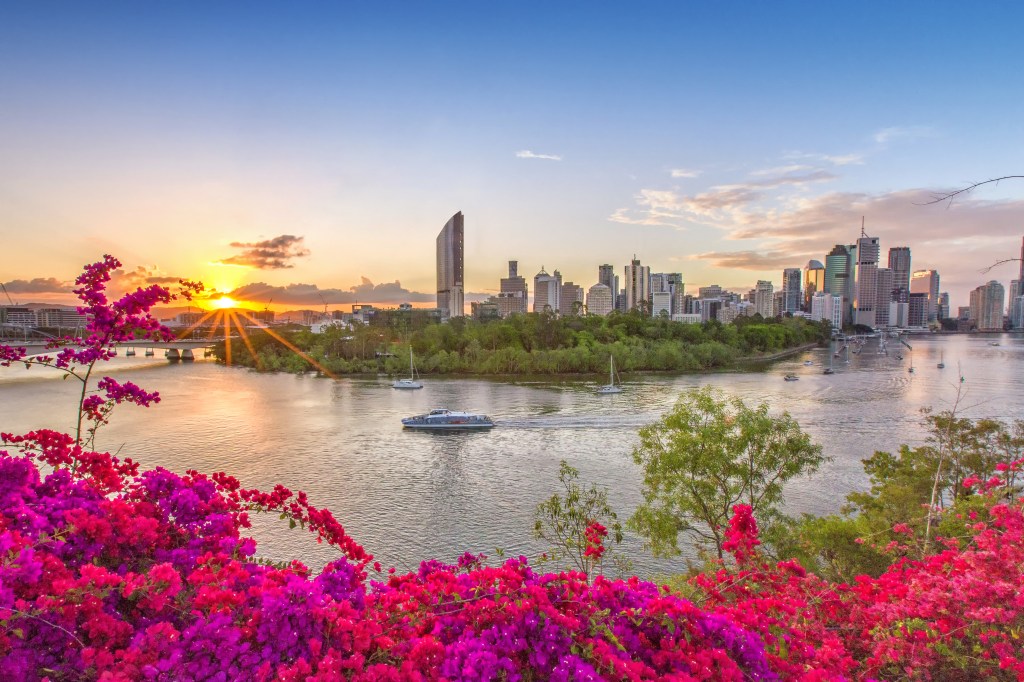
Queensland is Australia’s third most populous state, home to 5.5 million people in 2023. Its capital city Brisbane is the domicile of 1.3 million, about a quarter of Queensland residents. And while people may think of the Sunshine State as a warm oasis for retirees, the economic growth of Brisbane and other cities is helping to expand and reinvent that narrative.
761,000 people are active in the Brisbane labour force, according to the Brisbane City Council. The Gross Regional Product (GRP) for the financial year ending 2021 was $181 billion. By 2041, the Brisbane economy is expected to grow 68% to $275 billion.
In May, the Brisbane Economic Development Agency (BEDA) and Deloitte Access Economics released a ‘State of the City‘ report on the city. Brisbane’s prospects are bright, according to the authors.
“Brisbane’s opportunities are defined by its strong economic and population growth, world-class education and talent, and connectivity with the Asia Pacific region,” says Pradeep Philip, a partner at Deloitte Access Economics and an author of the report.
“The city is emerging as Australia’s fastest-growing capital city and an economic powerhouse in the region, in part due to its investment and momentum in innovation.”
Pradeep Philip
In 2021, Healthcare and Social Assistance was industry sector with the highest number of employees. Retail and Education tied at number two. Construction was third. By 2041, Scientific and Technical services is projected to take over all of those sectors, and become Brisbane’s leading industry.
“The city is setting the pace for global innovation in quantum computing, artificial intelligence, robotics, and creative industries, with a highly skilled workforce and investment driving these fast-growing industries,” Philip told Forbes Australia.
Queensland and Quantum
Advanced manufacturing – specifically robotics, biomedical, food technology and aerospace innovation – is seen as a specific area of growth. By 2031, it is expected Brisbane’s advanced manufacturing industry will grow by 29% from where it was three years ago.
The knowledge economy in Brisbane is projected to grow at an even faster clip, expanding 50% by 2031. This month the federal and state governments committed $1 billion to build a world-first fault-tolerant quantum computer in Brisbane.
The PsiQuantum deal is expected to bring 400 new highly skilled jobs to Brisbane and positions the city as world-leading in the realm of quantum computing. The company is led by Australian Professor Jeremy O’Brien who developed elements of the technology while working as a research fellow at the University of Queensland.
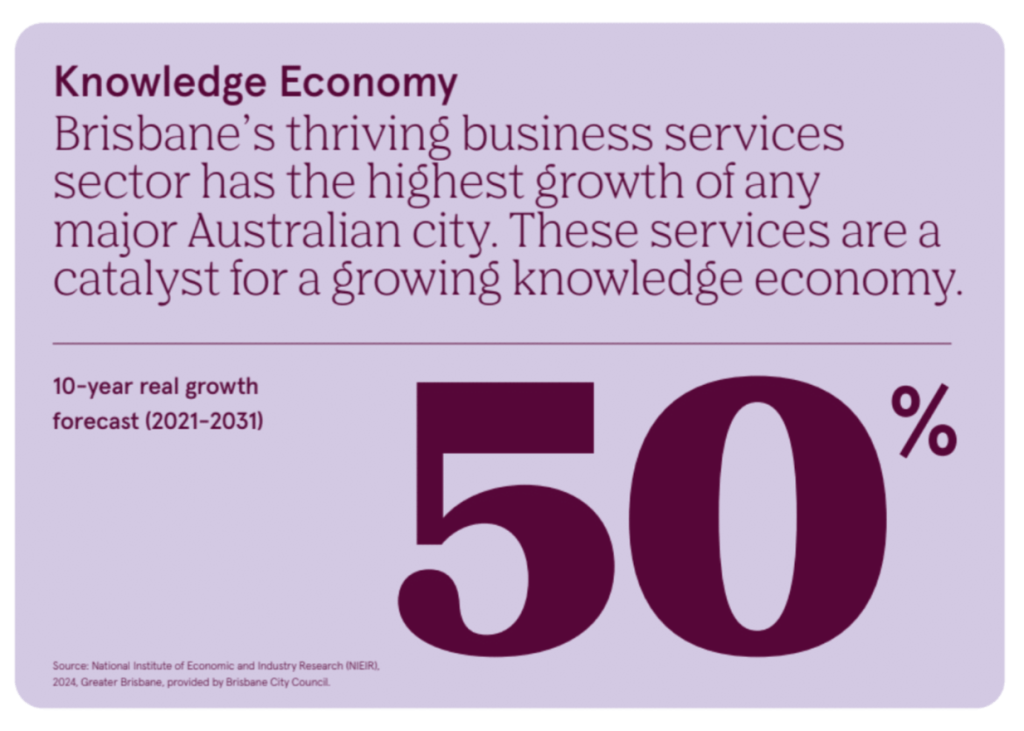
Innovation hubs are already at an all-time high in the city according to Deloitte.
“Brisbane has the highest density of innovation hubs in Australia and reports more business expenditure on research and development per person that any other major Australian capital,” says Philip.
Biotech and robotics
Biotech is another industry where Brisbane can continue to excel. David Hoey is the CEO of Vaxxas, an innovative needle-free vaccine company headquartered in the city.
“Brisbane has the perfect set of ingredients to become a world leader in the biotech and medtech space – fantastic infrastructure, regulatory environment and universities. Hundreds of companies, like Vaxxas, are choosing to advance their innovations here and contribute to the thriving local economy.”
Genics is another dynamic biotech company based in Brisbane. The firm customises health care and breeding programs on farms.
On the robotics front, Australian Droid and Robots is pioneering the use of robotics in mining and other complex workspaces.
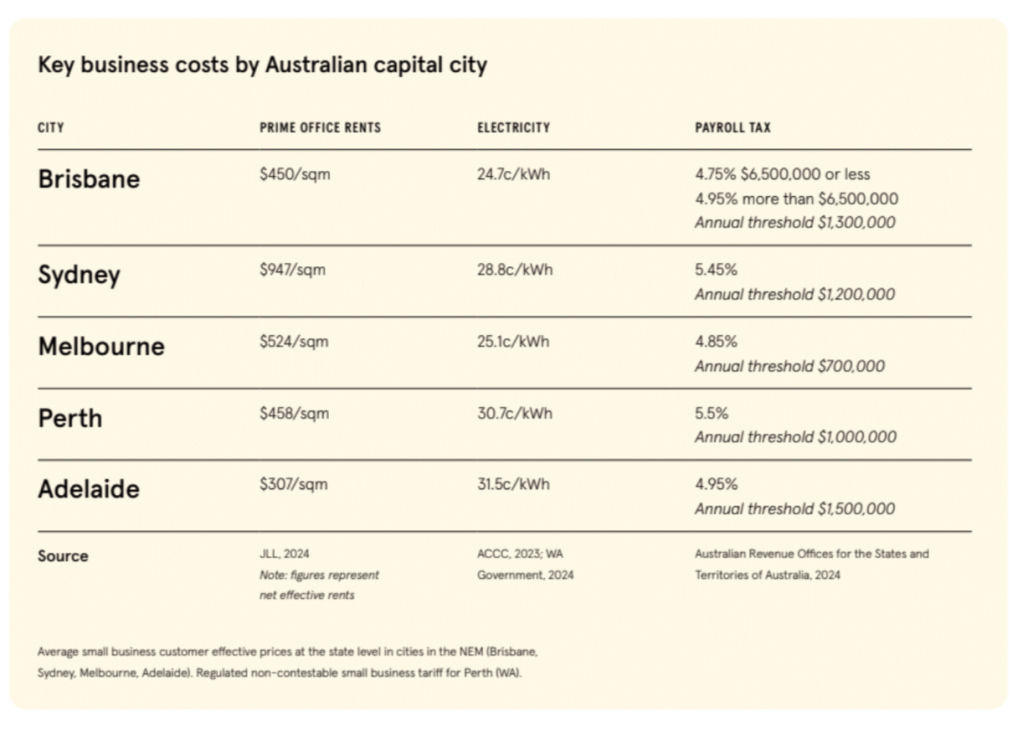
Exports to grow by 41% by 2031, transport by 43%
Transport and logistics is the sector that will see the second-highest growth by 2031, according to the BEDA report. Not only does growth in transportation set Brisbane up for success at the Olympic games the year after, it also provides a platform for exports to grow, according to the Brisbane Economic Development Agency (BEDA).
“Brisbane’s geographic position will propel the city over the next 10 years, with exports forecast to swell by 41 per cent. Underpinning this, our transport and logistics sector is growing faster than the national average, and our freight network is more efficient and cheaper than any other major capital,” says Anthony Ryan, the CEO of BEDA.
Markets in Asia are a target for exports from Brisbane businesses.
“Geographically positioned as Australia’s gateway to the thriving Asian markets, Brisbane offers lucrative export prospects to key destinations like China, Singapore, Japan, South Korea, and the Middle East,” says Ryan.
Unsurprisingly given the 2032 Brisbane Olympics, the construction sector will also expand significantly over the next seven years. $25 billion has been put toward a pipeline of infrastructure projects. It is not just sporting venues that are being built, however. Commercial real estate is also being invested in.
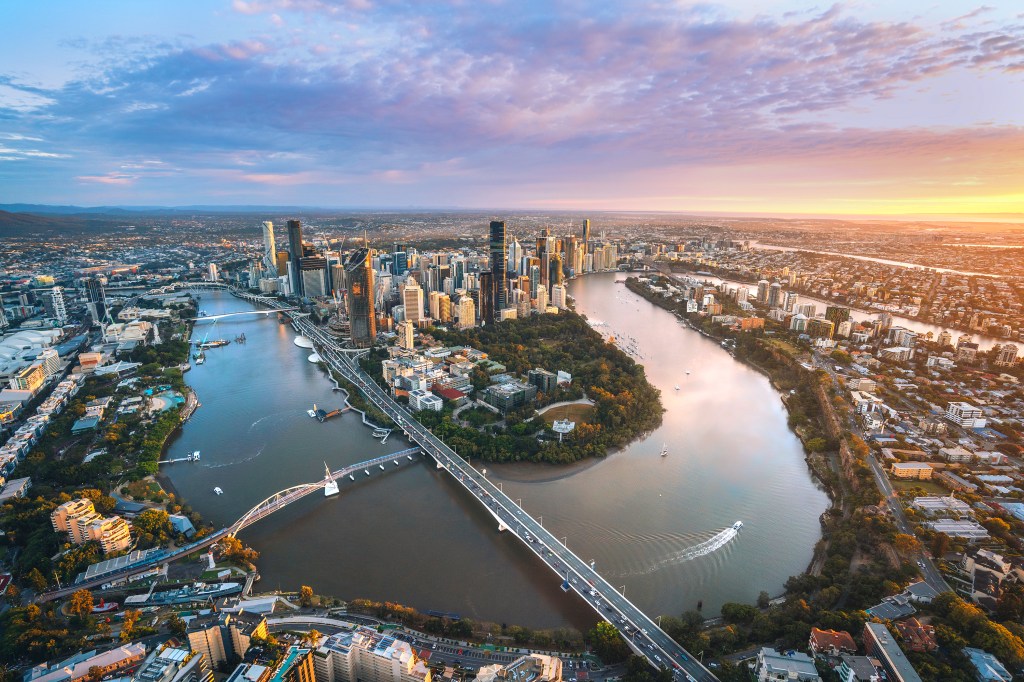
“Brisbane leads Australia’s major centres in key indicators of commercial property demand, with absorption in prime gradestock 65% higher than Perth, the next strongest market, and year-on-year rental growth of 11.3%, over three times higher than average. This is supported by a lower vacancy rate than comparable cities,” the BEDA report states.
There is also strong demand in residential construction due to the population growth boom in Brisbane – 21% over the last decade. The city not only led Melbourne, Sydney, and Perth in population growth over the last 10 years, it also grew significantly faster than Auckland, Hong Kong and Singapore, according to the BEDA report.
Experience economy
Another piece of the Brisbane-boom puzzle, can be explained by looking at the experience economy.
Queensland has long been known as the state to visit for Sea World, Movie World and Dreamworld. While those attractions are based on the Gold Coast, Queensland’s capital city one hour north benefits from visitors to the theme parks too. Brisbane’s experience economy is projected to grow 41% over the next decade.
Visitors to Brisbane spent more than $10 billion in the region last year. The Brisbane hotel market leads every other Australian city when it comes to revenue per available room. In 2023, only two cities in the country had higher occupancy rates than they had pre-covid. Brisbane is one of them.
“Brisbane is the tourism hero of Queensland, boasting the highest combined international and domestic overnight visitor expenditure of the state,” the BEDA report states.
“Growth in the experience economy in Brisbane – which includes spending from locals and visitors on accommodation and food services, the arts and recreation services – is set to top 3.0% annually to 2031.”
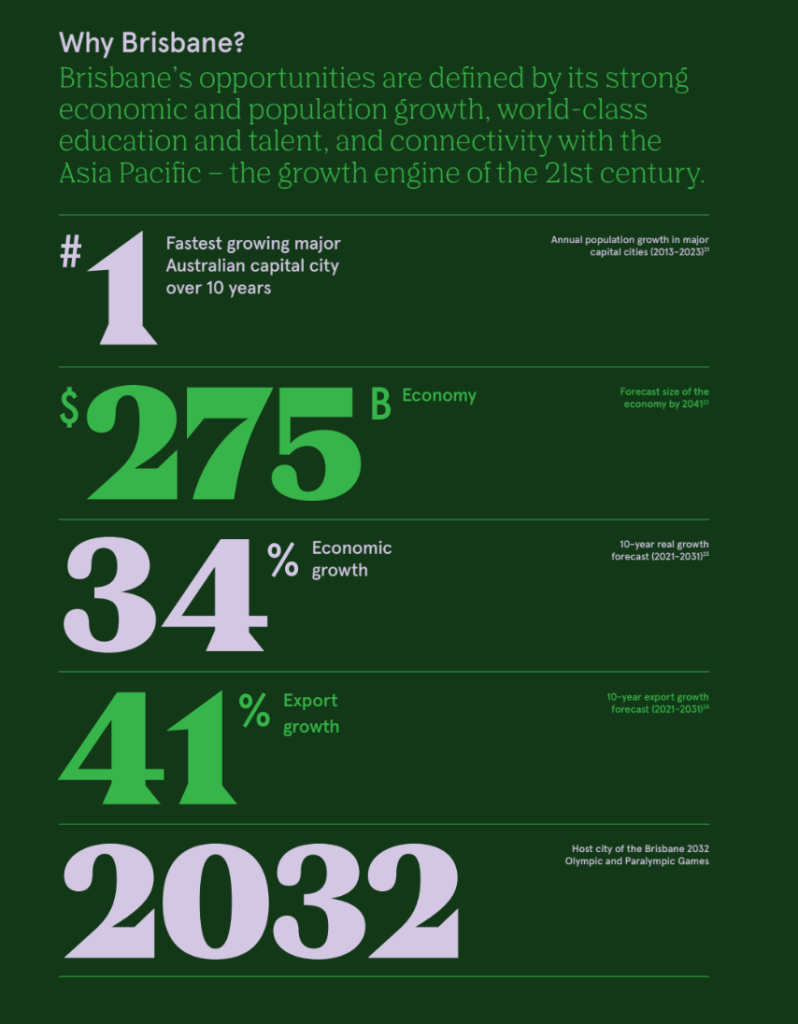
The year after, Brisbane will host one of the greatest experience events in the world.
“The Brisbane 2032 Olympic games will boost the Queensland economy by around $8.1 billion,” former Queensland Premier Annastacia Palaszczuk said in 2021. “Queensland’s greatest single economic opportunity comes from hosting the 2032 Olympic and Paralympic games.”
The infrastructure spend to get the city ready for the Olympics will have benefits long after 2032 according to the state government.
“The $7.1 billion venue infrastructure program will reshape some of Queensland’s most significant venues and precincts, leaving a legacy for the community well after 2032,” a state government report reads.
Current State Premier Steven Miles agrees that funds spent on preparing Brisbane for the Olympics need to have impact beyond 2032.
“No one wants to see money spent on facilities that are only needed for four weeks,” Miles says. He signed off on a revised plan in March of this year, reallocating the budget to projects that will have long-term value:
- The new Brisbane Arena will now be in a different location at Roma St precinct.
- Upgrades planned for the Queensland Sports and Athletics Centre (QSAC) and Suncorp Stadium, subject to due diligence and consultation with games partners.
- Exploring legacy transport opportunities to link QSAC, QEII hospital, and Griffith University with connected precincts in the city.
- Proposed new stadium for Victoria Park has been ruled out.
- Gabba rebuild will not proceed.
“This new direction will deliver decades of benefit to local schools, community athletics programs, and Olympic and Paralympic athletes in 2032 and beyond,” says Miles.
Look back on the week that was with hand-picked articles from Australia and around the world. Sign up to the Forbes Australia newsletter here or become a member here.


